News
Special Lecture
[Global CEO Talk] EU x KU session…Ambassador Maria Castillo Fernandez
On May 1st at Hyundai Motors Building, Korea University Business School's Global MBA Program hosted an insightful session with Ambassador Maria Castillo Fernandez, focusing on the geo-economics of EU-RoK relations. The event drew an enthusiastic audience eager to delve into the complexities of international trade between the European Union and South Korea.
The event began with a warm welcome from Dean Sangyong Kim, who emphasized Korea University Business School's unique position as the best business school in Korea and the only institution offering a Master in Management (MIM) program. Dean Kim proudly highlighted the diversity of the Global MBA program, which includes students from 17 countries and boasts an international student population of 75%. This diversity of backgrounds, he argued, makes for a rich learning environment where students can exchange different perspectives and ideas about business.
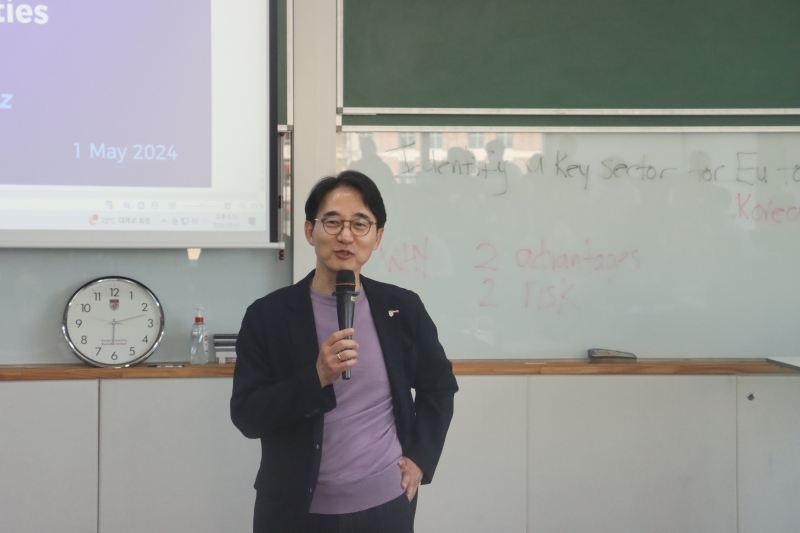
Professor Betty then introduced Ambassador Maria Castillo Fernandez and Christoph Bess, head of trade, stressing the importance of fostering global leadership through dialogues amongstudents, faculty, community members, and diplomats. The session began with the ambassador outlining the strategic importance of strengthening EU-Korea trade relations in light of current geopolitical and economic uncertainties. She emphasized the need for strong partnerships to address the challenges presented by shifting global economic dynamics.
Ambassador Maria began by emphasizing that the EU's economic security strategy focuses on "de-risking," not "decoupling." She stressed that the EU remains committed to fostering open trade and investment, a key pillar of its economic growth. The EU's Economic Security Strategy, introduced in June 2023, seeks to maximize the benefits of economic openness while minimizing vulnerabilities through a unified EU approach. This comprehensive strategy has been further bolstered by new initiatives announced in January 2024, which promote competitiveness, protect economic security, and strengthen partnerships with reliable allies.
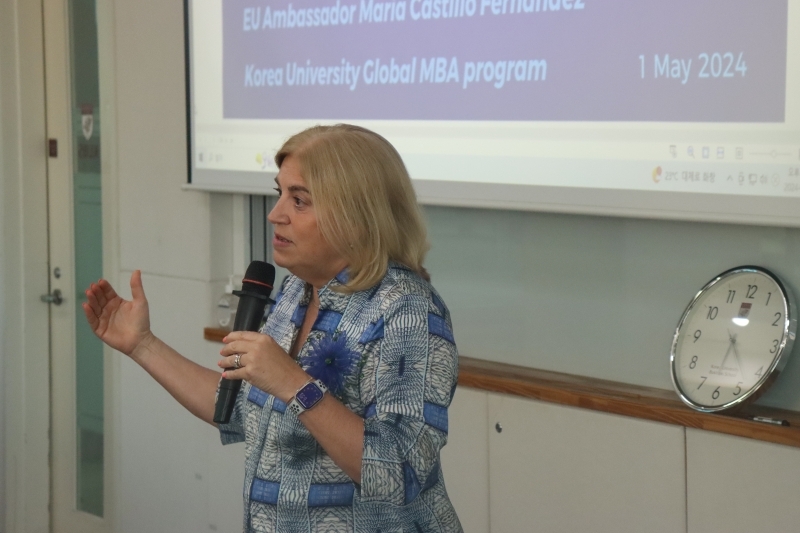
She highlighted several global shifts impacting international trade, such as the weakening of the World Trade Organization (WTO), China's assertive trade practices, and the weaponization of economic interdependence by various actors. Such changes have blurred the lines between geopolitics and commerce, creating new challenges for international relations. In response to these shifts, the EU is working to find the right balance between maintaining open markets and enhancing protective measures to safeguard its economic interests.
The EU-South Korea Free Trade Agreement (FTA), which took effect in 2011, has been a cornerstone of bilateral trade. Eurostat data showed steady growth in EU-Korea trade despite global disruptions, with EU exports reaching €57.1 billion in 2023 and imports standing at €72.8 billion. Machinery, transportation equipment, and chemicals continue to dominate bilateral trade, while smaller sectors like wine, cheese, and footwear have flourished under the agreement, underlining its broad economic benefits.
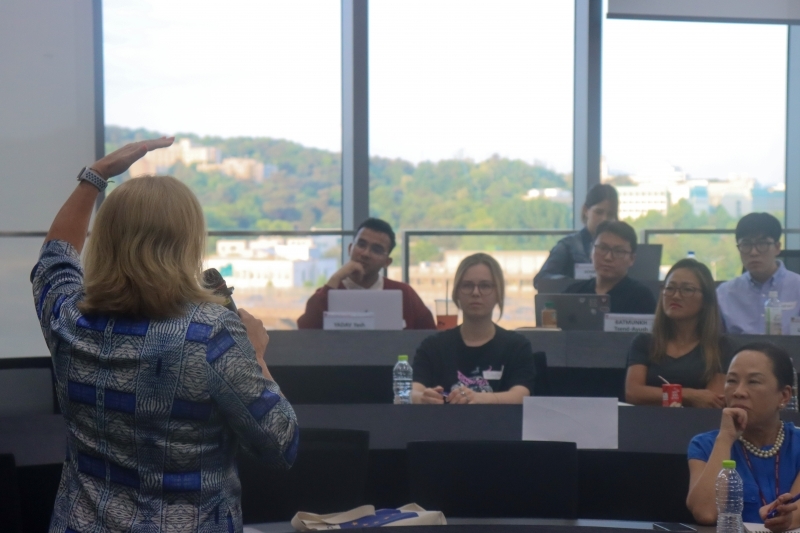
The ambassador discussed challenges posed by the digital economy and environmental sustainability to traditional trade frameworks. Both the EU and Korea are uniquely positioned to capitalize on these shifts for economic growth. The digital economy represents both an opportunity and a challenge, requiring nations to adapt their regulatory frameworks to keep up with rapid technological advancements. Environmental sustainability, particularly in the context of climate change, demands a collaborative global response. The EU has long been a proponent of strict environmental regulations, and Korea has also made strides in this direction. Both regions can benefit from sharing their experiences and knowledge in crafting future policies.
During her talk, Ambassador Maria emphasized the potential sectors for future collaboration between the EU and Korea, with a particular focus on technology, renewable energy, and education. In technology, both regions have invested heavily in research and development, particularly in emerging fields like artificial intelligence and green technology. By aligning their goals and fostering joint ventures, the EU and Korea can create new opportunities for innovation and economic growth.
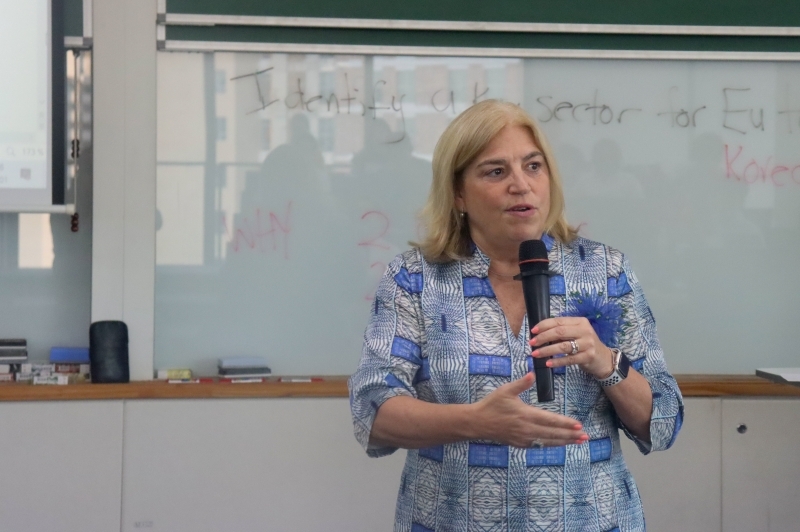
Renewable energy represents another critical area of potential collaboration. As the world seeks to reduce its dependence on fossil fuels, the EU and Korea are uniquely positioned to lead in renewable energy research and development. From offshore wind farms to cutting-edge solar panels, the EU and Korea have the expertise and resources to set the standard for clean energy adoption.
Ultimately, she stressed that the EU and South Korea can navigate these uncertain times by working together with like-minded partners to address shared security concerns and strengthen strategic sectors. Through concerted efforts, the EU and South Korea are poised to deepen their partnership and reinforce their global economic influence. By leveraging their shared values of openness, innovation, and cooperation, the EU and South Korea can build a more resilient and prosperous future.
After Ambassador Maria’s informative session, Professor Betty led a collaborative exercise where she divided the attendees into teams of four to five people, creating diverse groups to tackle a practical question. The challenge was for each team to identify one key sector in which the European Union should invest in South Korea. This approach encouraged strategic thinking and cross-cultural insights.
After internal team discussions, representatives from each side presented their findings, focusing on the vulnerabilities and advantages of each sector. Teams suggested investing in industries like skincare, semiconductors, education, and energy. Skincare emerged as a compelling option due to the potential for diversification, while education was identified as an important area for
cultural exchange programs. Energy was another promising sector, with the EU able to provide advanced technology to Korea for producing renewable energy.
Christoph Bess expanded on these points, noting the mutual strength of the EU and Korea in the cosmetics industry. He cited Amore Pacific and L'Oréal as regional leaders, emphasizing that their products are easier to trade than agricultural goods due to fewer complexities. He highlighted the EU's advantage as a large market with a mature and affluent population, emphasizing that purchasing power is crucial when assessing trade potential.
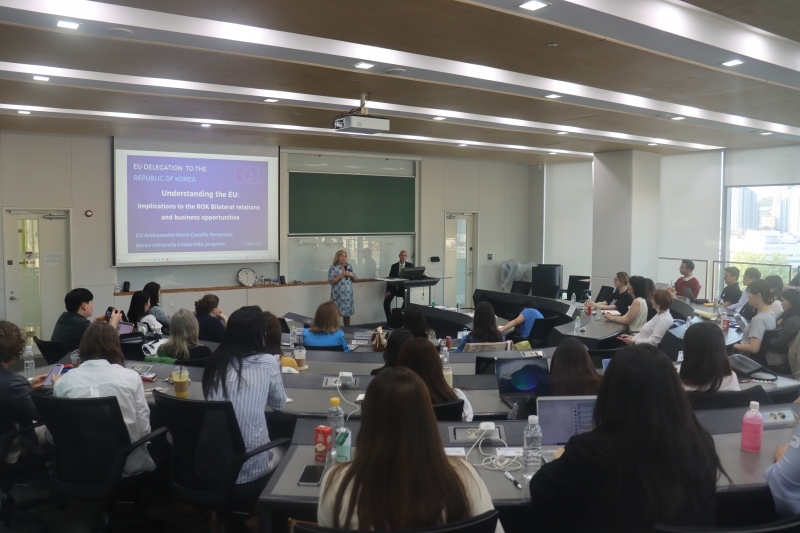
While talking about EU's concerted efforts to attract further Korean investments, Christoph elaborated on the European Chips Act, designed to attract chip manufacturers and foundries to Europe. He pointed out that Europe is strong in automotive chips but less prominent in memory chips, which is a specialty of Samsung. He emphasized the importance of market demand in Europe when considering investment opportunities and referenced ASML's successful partnership with Samsung as an example of a fruitful collaboration.
Turning to agriculture, Christoph acknowledged that Korea isn't strong in exports beyond kimchi, samgyetang, and seaweed. However, there is a growing European interest in Korean cuisine, which can initially serve the Korean diaspora before expanding to a wider audience. He mentioned that European technology could enhance agricultural investment in Korea.
The session concluded with Professor Betty encouraging the participants to leverage the people around them to create thought partnerships and thanked the EU representatives for their insights. This collaborative environment provided a fertile ground for new ideas, helping participants deepen their understanding of the geo-economics behind EU-Korea trade and security relations.


